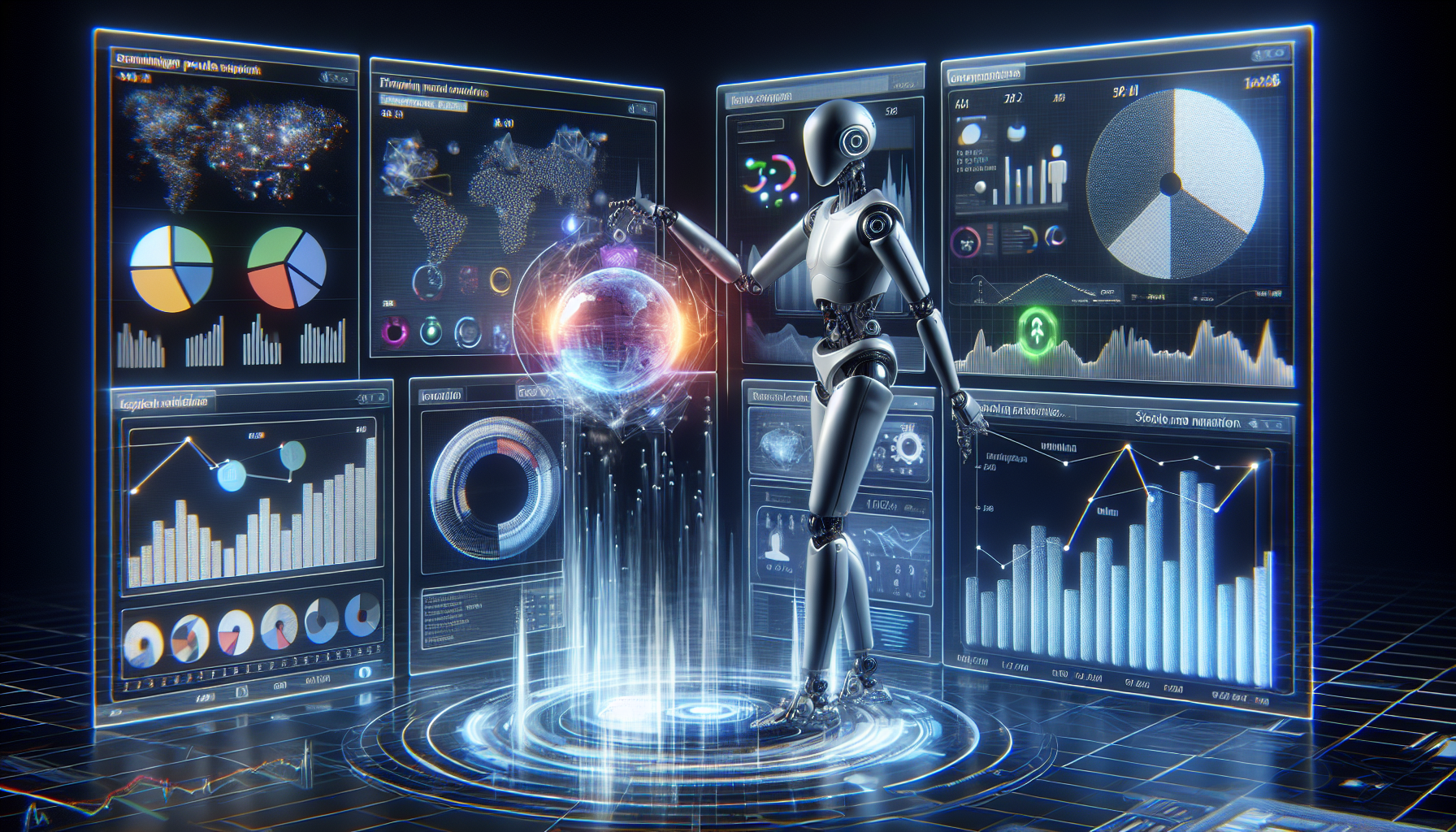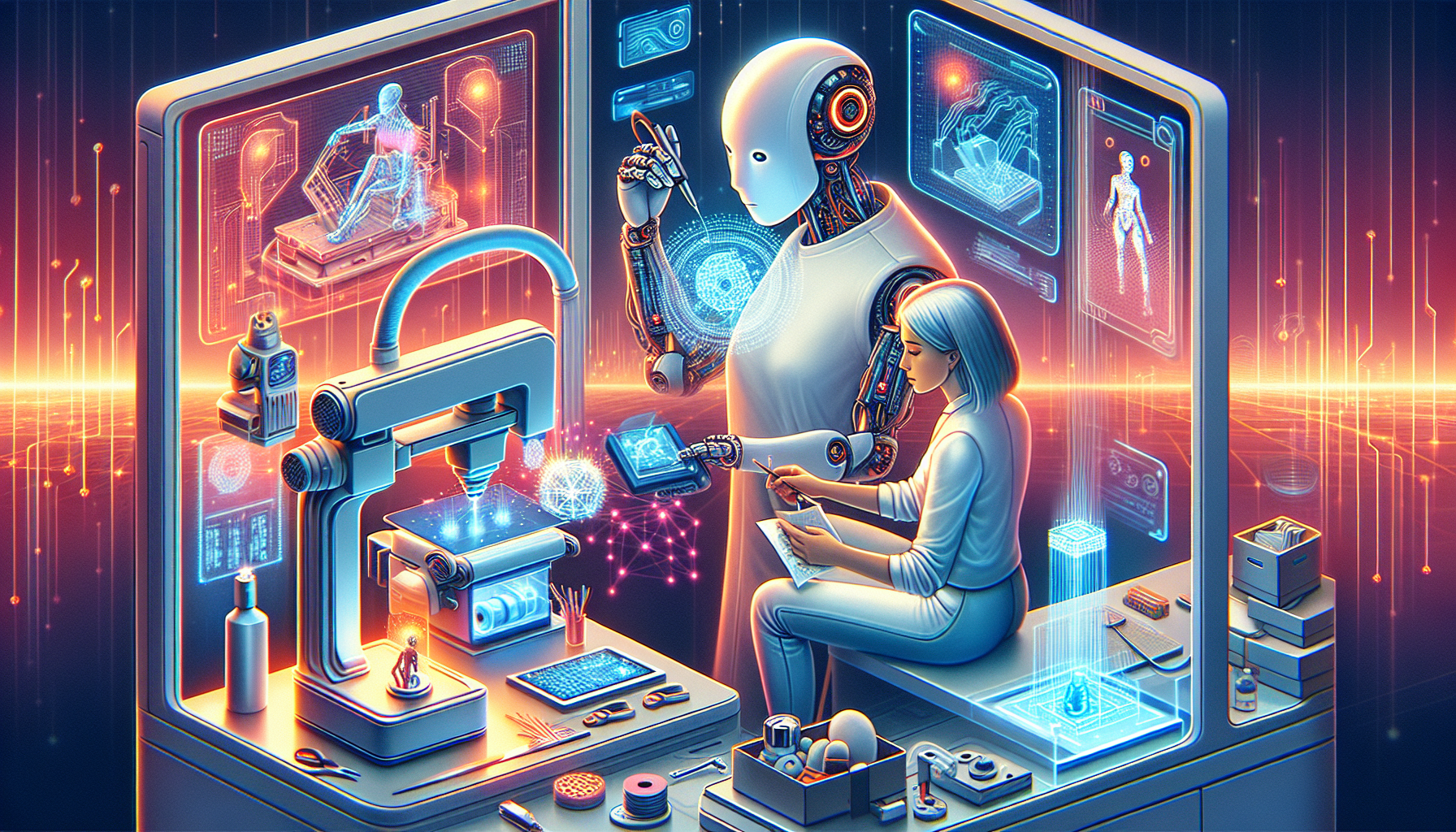Curious how AI can revolutionize product development? AI tools are now essential in optimizing every stage, from concept to completion. This article explores the benefits and key applications of AI in product development, helping you stay ahead in innovation and efficiency.
Key Takeaways
- Artificial intelligence (AI) is significantly transforming every stage of product development, enhancing processes such as predictive maintenance, market analysis, design, prototyping, quality assurance, and security.
- Integrating AI into product development offers substantial benefits, including increased efficiency and productivity, data-driven insights for better decision-making, improved customer satisfaction through personalization, and fostering innovation and creativity.
- Adopting AI in product development poses challenges and ethical considerations, such as addressing biases, ensuring transparency and explainability, protecting privacy, and maintaining human oversight, which are crucial for responsible AI implementation.
Introduction
Artificial intelligence is fundamentally reshaping the product development process. From the initial spark of an idea to the final deployment, AI enhances every stage, bringing unprecedented innovation, quality, and efficiency. This revolution isn’t just theoretical; it’s happening right now, with a market growth trajectory that’s simply staggering. The global AI development market is projected to balloon from $86.9 billion in 2022 to a whopping $407 billion by 2027.
Imagine the possibilities when AI tools, including natural language processing, analyze vast amounts of data in real-time, offering insights that were previously unimaginable. AI doesn’t just automate repetitive tasks; it transforms how we think about product creation, enabling designers and engineers to push the boundaries of what’s possible.
In this blog post, we’ll unravel how AI impacts product development, particularly in the following areas:
- Predictive maintenance
- Market analysis
- Design
- Prototyping
- Quality assurance
- Security
Additionally, we’ll examine the concrete advantages of AI integration, including its impact on:
- Efficiency
- Decision-making
- Customer satisfaction
- Innovation
Yet, with great power comes great responsibility. We will address the challenges and ethical considerations that come with AI, ensuring that its deployment is both effective and ethical.
Finally, we’ll look ahead to future trends and provide practical steps on how to start integrating AI into your product development process.
Key Applications of AI in Product Development

The applications of AI in product development are vast and varied, revolutionizing the way products are conceived, designed, and brought to market. Leveraging AI’s capabilities, businesses can enhance every phase of the product development lifecycle, including:
- Ideation
- Market analysis
- Design
- Testing
- Security
We will discuss five vital applications of AI in product development encompassing predictive maintenance, market analysis, product design, quality assurance, and product security.
Predictive Maintenance

In product development, predictive maintenance stands out as one of the most valuable use cases for AI. It helps in identifying potential issues before they occur, reducing downtime and increasing efficiency. By leveraging machine learning algorithms, AI can analyze equipment sensor data to predict potential failures before they occur. This not only optimizes production processes but also significantly reduces downtime and maintenance costs, ensuring seamless operations and enhanced product lifecycle management.
Market Analysis and Trend Prediction

AI-powered tools are revolutionizing market analysis and trend prediction by analyzing vast datasets from sources such as social media, customer reviews, and industry reports. These tools use predictive analytics to uncover market trends and consumer preferences, helping businesses refine their product development strategies and predict the potential success of different product concepts.
Moreover, AI can:
- Identify patterns in competitor data, offering valuable insights that help in crafting more effective product strategies
- Analyze historical product data and predict future trends
- Provide a data-driven approach to decision-making, ensuring that products meet evolving market demands and customer needs.
Product Design and Prototyping

AI streamlines the product design and prototyping process by enabling rapid iterations and innovative design concepts. Generative AI can create multiple design options based on defined parameters, allowing human designers to explore a wider range of possibilities. This accelerates the time to market and optimizes product performance by ensuring that designs are both unique and optimized.
AI-powered tools have the capability to:
- Transform sketches into functional prototypes, saving time and improving collaboration among teams with different expertise
- Automate tasks like CAD modeling, which contributes to reducing design time
- Conduct advanced simulations and user interaction simulations, resulting in prototypes that closely reflect real-world user behavior and preferences
These capabilities of AI-powered tools lead to better product designs.
Quality Assurance and Testing

Quality assurance and testing are critical components of the product development process, and AI significantly enhances these areas by automating testing and ensuring high-quality products. Quality control systems driven by AI utilize computer vision and machine learning for precise and speedy defect inspection of products. This approach ensures high accuracy in identifying any faults. This automation not only saves time but also improves user satisfaction by ensuring consistent product quality.
Additionally, AI has the capability to simulate different scenarios and identify potential design flaws, allowing for optimization of product performance before physical prototypes are constructed. This provides a more efficient and cost-effective process for product development. By leveraging machine learning models trained on extensive specifications and quality benchmark datasets, AI ensures that products meet the highest standards of quality and performance.
Enhancing Product Security
In an era where cyber threats are increasingly sophisticated, AI provides robust solutions to safeguard products against unauthorized access and data breaches. AI algorithms are adept at identifying potential vulnerabilities and monitoring suspicious activities, making them highly effective at detecting anomalies. By integrating AI-driven security measures, businesses can fortify their products and ensure the security of sensitive information.
Edge AI further enhances product security by:
- Processing data locally on the device instead of transferring it over networks, reducing the risk of data breaches
- Optimizing product performance
- Accelerating the time to market by ensuring that security measures are integrated seamlessly into the product development process.
Benefits of Integrating AI into Product Development
The integration of AI into product development brings a plethora of benefits, including:
- Increased efficiency and productivity
- Data-driven insights
- Improved customer satisfaction
- Enhanced innovation
In this segment, we will examine these benefits and demonstrate how AI equips businesses with the tools to refine their product development strategies, ensuring competitiveness in a rapidly changing market.
Increased Efficiency and Productivity
AI automates repetitive tasks, allowing product managers to focus on higher-level strategic decisions and reducing the workload associated with mundane activities. This automation streamlines workflows, enhances internal communications, and accelerates the product development timeline. By analyzing vast quantities of data quickly and ensuring its relevance and accuracy, AI prevents costly errors and boosts overall productivity.
Moreover, AI tools can schedule meetings, manage calendar events automatically, and facilitate brainstorming sessions, further reducing the time spent on organizing and helping teams stay on track. These capabilities enable businesses to accelerate their time to market and optimize product performance, ensuring that they remain competitive in a dynamic market.
Data-Driven Insights and Decision Making
AI enables data-driven decision-making by analyzing large data sets and predicting future scenarios based on historical data. This predictive capability helps businesses plan better and allocate resources more efficiently, ensuring that their product strategies are aligned with market demands and customer needs.
By providing insights from data analysis, AI tools help teams make better-informed decisions, reducing the likelihood of human error and enhancing the overall effectiveness of the product development process. This data-driven approach ensures that products are optimized to meet user expectations and market trends, ultimately leading to greater success in the market.
Improved Customer Satisfaction and Personalization
AI improves customer satisfaction by:
- Providing personalized experiences
- Recommending features that align with user preferences
- Analyzing customer data to identify preferences
- Recommending personalized product features
- Enhancing user engagement and satisfaction by suggesting complementary products.
Recommendation engines that are powered by AI analyze user behavior and preferences before delivering personalized product recommendations. This results in more intuitive and user-friendly experiences for customers. This level of personalization not only improves customer satisfaction but also builds brand loyalty, ensuring that customers return for future purchases.
Enhanced Innovation and Creativity
AI fosters innovation and creativity by:
- suggesting unique design approaches
- optimizing design processes
- simulating diverse scenarios
- detecting potential design flaws
- providing intelligent recommendations for optimizing design and development processes
This ensures that products are both unique and high-performing, enabling businesses to stay ahead of the competition.
By harnessing AI’s capabilities, businesses can explore unconventional ideas and generate innovative solutions that might not have been considered otherwise. This empowers human designers to push the boundaries of what’s possible, leading to the creation of unique and optimized products that resonate with customers.
Challenges and Ethical Considerations in AI Product Development
While the benefits of AI in product development are immense, there are also significant challenges and ethical considerations that must be addressed. Ensuring that AI systems are fair, transparent, and accountable is crucial for their successful implementation.
We will discuss these challenges and ethical considerations, highlighting four specific areas: bias, transparency, privacy, and human oversight.
Bias in AI Models
AI models trained on biased data can result in discriminatory outcomes in critical areas such as hiring and lending. Ethical AI development involves addressing and mitigating these biases to ensure fair and equitable outcomes.
By carefully curating and diversifying training data, businesses can reduce the risk of bias and promote more inclusive AI solutions.
Transparency and Explainability
Ensuring transparency and explainability in AI decision-making is essential for user understanding and accountability. Explainable AI ensures that AI systems are more transparent and their decisions are understandable, preventing bias and discrimination. This is particularly important in regulated industries, where lack of transparency can pose significant ethical and legal challenges.
Privacy and Data Protection
AI systems often rely on personal data, making robust protection of user privacy and data confidentiality crucial. Organizations must prioritize robust data protection mechanisms to prevent misuse or unauthorized access to sensitive information. This ensures that AI systems uphold ethical standards and respect individuals’ privacy.
Balancing AI and Human Oversight
Balancing AI with human oversight ensures that AI augments rather than replaces human capabilities. AI is designed to support and enhance human decision-making processes while also recognizing and upholding the importance of human input and judgment. It aims to complement human judgment and preserve the integrity and discretion of human involvement in decision-making.
This balance is essential for maintaining trust in AI systems and ensuring that they are used responsibly.
Future Trends in AI-Driven Product Development
As AI continues to evolve, several future trends in AI-driven product development are emerging. These trends include:
- Generative AI for ideation and design
- Edge AI
- AI-powered collaboration tools
- Sustainable and ethical AI practices
We will discuss these trends, emphasizing their prospective influence on the product development process.
Generative AI for Ideation and Design
Generative AI models, such as OpenAI’s DALL.E and ChatGPT, are significantly impacting digital design and content creation, enabling new forms of ideation. These tools can quickly produce a multitude of design options, streamlining the creative process and leading to more innovative and efficient product solutions. This capability allows designers to explore unconventional ideas that might not have been considered otherwise.
Edge AI in Product Development
Edge AI enhances real-time decision-making by processing data locally on devices rather than relying on centralized data centers. This reduces latency and facilitates instantaneous responses, making it crucial for applications requiring real-time decision-making.
Edge AI also enables the processing of big data generated by connected IoT devices at the network edge, enhancing intelligent automation and connectivity.
AI-Powered Collaboration Tools
AI-powered collaboration tools can:
- Improve communication and coordination among team members, even in remote settings
- Automate routine tasks, allowing team members to focus on more strategic activities
- Enhance overall productivity
By managing virtual meetings, scheduling, sending reminders, and transcribing notes, AI assistants make collaboration more efficient and effective.
Sustainable and Ethical AI Practices
Promoting sustainable and ethical AI practices is crucial for responsible product development. Sustainable AI practices include optimizing algorithms to reduce energy consumption and minimize environmental impact. Additionally, promoting diversity in AI development teams leads to more inclusive and representative AI solutions.
By navigating ethical considerations and integrating sustainable practices, businesses can ensure that their AI technologies are developed and deployed responsibly.
How to Start Integrating AI into Your Product Development Process
To incorporate AI into your product development process, it’s crucial to first pinpoint specific use cases that match your business objectives. Conduct thorough market research using AI-powered analytical tools to identify unique product concepts that resonate with market needs and stand out amidst the competition. This data-driven approach ensures that your product strategies are aligned with market demands and customer preferences.
Conducting Market Research
Market research is a critical first step in integrating AI into product development. Here are some steps to follow:
- Use AI-powered tools to analyze customer data.
- Extract valuable insights from the data.
- Predict future trends based on the insights.
- By understanding market trends and changing demands, you can identify a unique product concept that meets unmet needs.
- Accelerate time to market by leveraging AI in product development.
This approach not only enhances user engagement but also ensures that your product development process, including the UX design process, is data-driven and aligned with market demands, thanks to valuable user feedback.
Building an AI-Skilled Team
It is crucial to build an AI-skilled team in order to navigate the complexities of AI integration. This will ensure that the organization is well-equipped to handle the challenges that come with implementing AI technologies. Here are some steps to build an AI-skilled team:
- Hire data scientists and machine learning engineers with experience in AI models relevant to your industry.
- If your team lacks AI expertise, consider outsourcing to external software development companies.
- Partner with AI research institutions to access cutting-edge knowledge and talent.
This ensures that your team is equipped with the necessary skills to harness AI algorithms and integrate AI technologies effectively.
Structuring AI Integration Phases
Strategically structuring the phases of AI integration is essential for maximizing the product’s capabilities. Here is a suggested approach:
- Start with pilot projects to test the effectiveness of AI integration.
- Scale up based on the success of these pilot projects.
- Gain insights from the pilot projects and use them to refine your AI integration strategy.
By adopting this phased approach, you can gradually integrate AI into your operations and ensure its success.
By strategically deciding the stages of product development where AI will be integrated, you can ensure that the development process is streamlined and that AI’s capabilities are leveraged effectively.
Summary
AI is revolutionizing product development, offering numerous benefits and applications across various industries. From predictive maintenance and market analysis to product design, quality assurance, and security, AI enhances every stage of the product development lifecycle. By integrating AI, businesses can increase efficiency, make data-driven decisions, improve customer satisfaction, and foster innovation.
However, it is essential to navigate the challenges and ethical considerations associated with AI deployment, such as addressing bias, ensuring transparency, protecting privacy, and balancing AI with human oversight. Looking ahead, future trends like generative AI, edge AI, AI-powered collaboration tools, and sustainable practices will continue to shape the landscape of AI-driven product development. By starting with market research, building an AI-skilled team, and structuring AI integration phases, businesses can effectively integrate AI into their product development processes and stay competitive in a rapidly evolving market. Embrace the transformative power of AI and lead the way in the next wave of innovation.
Frequently Asked Questions
How does AI improve efficiency in product development?
AI improves efficiency in product development by automating repetitive tasks, streamlining workflows, and accelerating data analysis, which ultimately allows product managers to focus on higher-level strategic decisions and reduces the overall product development timeline.
What are some key applications of AI in product development?
AI is used in product development for predictive maintenance, market analysis, product design, quality assurance, and product security, helping to improve and innovate the products.
How can AI help in market analysis and trend prediction?
AI can assist in market analysis and trend prediction by analyzing large datasets from various sources to identify market trends and consumer preferences, allowing businesses to refine their product strategies and predict product success.
What are the ethical considerations in AI product development?
In AI product development, it’s important to address bias in AI models, ensure transparency and explainability, protect privacy and data, and balance AI with human oversight. These considerations are crucial for ethical development.
How can businesses start integrating AI into their product development process?
Businesses can begin integrating AI into their product development process by identifying AI use cases, conducting market research, building an AI-skilled team, and structuring the integration phases. This phased approach enables gradual implementation and refinement of AI strategies.
About InTech Ideas
If you’re looking to elevate your tech strategy and drive business growth, InTech Ideas is here to help. We offer a comprehensive suite of services, including Software Development Teams, Product Development Fast Track, and Product Leadership & Advisory. Whether you need to scale your development team, fast-track your product, or bring in expert leadership, we provide tailored, people-first solutions that align with your company’s goals. Learn more about how we can support your journey by exploring our services or contacting us today to discuss your specific needs.

